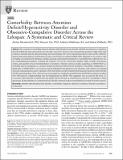| dc.contributor.author | Abramovitch, Amitai | en_US |
| dc.contributor.author | Dar, Reuven | en_US |
| dc.contributor.author | Mittelman, Andrew | en_US |
| dc.contributor.author | Wilhelm, Sabine | en_US |
| dc.date.accessioned | 2015-08-03T14:02:17Z | |
| dc.date.issued | 2015 | en_US |
| dc.identifier.citation | Abramovitch, Amitai, Reuven Dar, Andrew Mittelman, and Sabine Wilhelm. 2015. “Comorbidity Between Attention Deficit/Hyperactivity Disorder and Obsessive-Compulsive Disorder Across the Lifespan: A Systematic and Critical Review.” Harvard Review of Psychiatry 23 (4): 245-262. doi:10.1097/HRP.0000000000000050. http://dx.doi.org/10.1097/HRP.0000000000000050. | en |
| dc.identifier.issn | 1067-3229 | en |
| dc.identifier.uri | http://nrs.harvard.edu/urn-3:HUL.InstRepos:17820864 | |
| dc.description.abstract | Abstract The concept of comorbidity between attention deficit/hyperactivity disorder (ADHD) and obsessive-compulsive disorder (OCD) has been discussed for two decades. No review, however, has examined this question in light of the stark contrast in disorder-specific phenomenology and neurobiology. We review reported prevalence rates and the methodological, phenomenological, and theoretical issues concerning concomitant ADHD-OCD. Reported co-occurrence rates are highly inconsistent in the literature. Studies aimed at examining the potential for comorbidity have suffered from various methodological problems, including the existence of very few community samples, highly variable exclusionary criteria, and possible clinical misinterpretation of symptoms. Despite numerous studies suggesting an ADHD-OCD comorbidity, thus far etiological (i.e., genetic) backing has been provided only for a pediatric comorbidity. Additionally, inflated rates of ADHD-OCD co-occurrence may be mediated by the presence of tic disorders, and evidence of impaired neuronal maturational processes in pediatric OCD may lead to possibly transient phenotypical expressions that resemble ADHD symptomatology. Thus, clinicians are encouraged to consider the possibility that ADHD-like symptoms resulting from OCD-specific symptomatology may be misdiagnosed as ADHD. This suggestion may account for the lower co-occurrence rates reported in adolescents and adults and for the lack of a theoretical account for comorbidity in these age groups. Existing literature is summarized and critically reviewed, and recommendations are made for future research. | en |
| dc.language.iso | en_US | en |
| dc.publisher | Lippincott Williams & Wilkins | en |
| dc.relation.isversionof | doi:10.1097/HRP.0000000000000050 | en |
| dc.relation.hasversion | http://www.ncbi.nlm.nih.gov/pmc/articles/PMC4495876/pdf/ | en |
| dash.license | LAA | en_US |
| dc.subject | attention-deficit/hyperactivity disorder | en |
| dc.subject | comorbidity | en |
| dc.subject | diagnosis | en |
| dc.subject | obsessive-compulsive disorder | en |
| dc.subject | prevalence | en |
| dc.subject | tic disorders | en |
| dc.title | Comorbidity Between Attention Deficit/Hyperactivity Disorder and Obsessive-Compulsive Disorder Across the Lifespan: A Systematic and Critical Review | en |
| dc.type | Journal Article | en_US |
| dc.description.version | Version of Record | en |
| dc.relation.journal | Harvard Review of Psychiatry | en |
| dash.depositing.author | Wilhelm, Sabine | en_US |
| dc.date.available | 2015-08-03T14:02:17Z | |
| dc.identifier.doi | 10.1097/HRP.0000000000000050 | * |
| dash.contributor.affiliated | Wilhelm, Sabine | |


